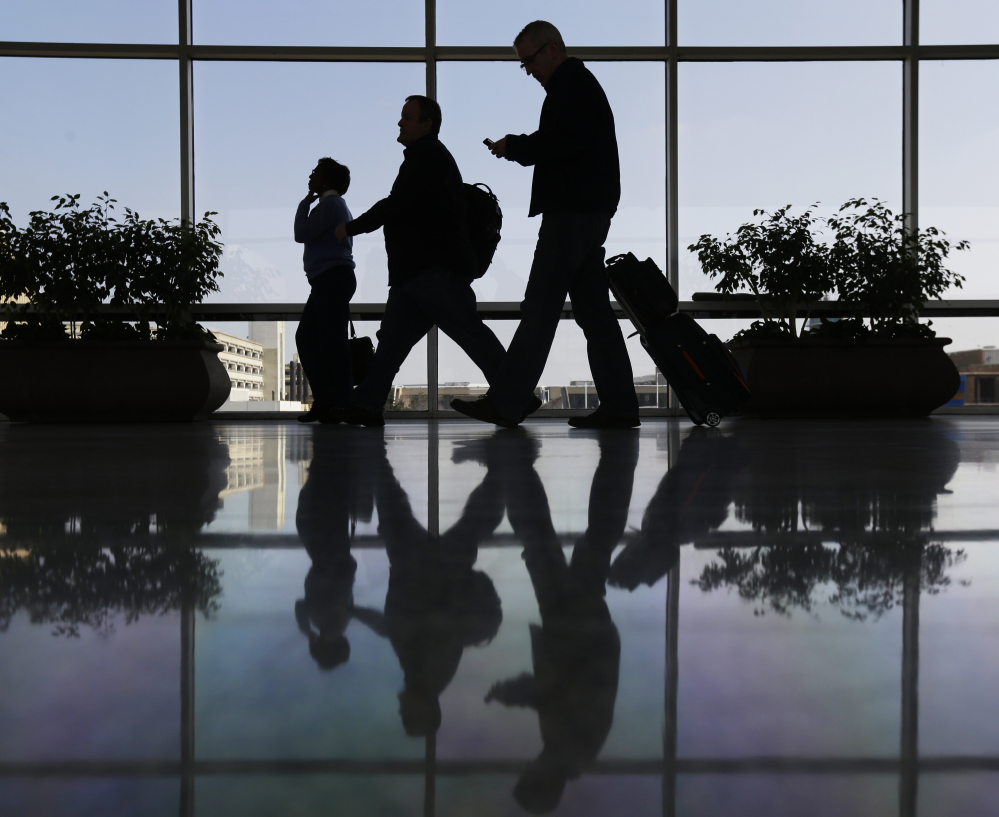WASHINGTON — The U.S. government is investigating possible collusion among major airlines to limit available seats, which keeps airfares high, according to a document obtained by The Associated Press.
The civil antitrust investigation by the Justice Department appears to focus on whether airlines illegally signaled to each other how quickly they would add new flights, routes and extra seats.
A letter received Tuesday by major U.S. carriers demands copies of all communications that the airlines had with each other, Wall Street analysts and major shareholders about their plans for passenger-carrying capacity, or “the undesirability of your company or any other airline increasing capacity.”
The Justice Department asked each airline for its passenger-carrying capacity both by region, and overall, since January 2010.
Spokeswoman Emily Pierce confirmed that the department is looking into potential “unlawful coordination” among some airlines. She declined to comment further or say which airlines are being investigated.
On a day when the overall stock market was up, stocks of the major U.S. airlines ended the day down 1 percent to 3 percent on news of the investigation.
“We received the letter and are complying,” United spokesman Luke Punzenberger said Wednesday. American Airlines also said it would cooperate with the Justice Department. Delta Air Lines and Southwest Airlines had no immediate comment. Smaller carriers, including Frontier Airlines, said they had not been contacted by the government.
The airlines publicly discussed capacity early last month in Miami at the International Air Transport Association’s annual meeting. After hearing about that meeting, U.S. Sen. Richard Blumenthal, D-Conn., requested a Justice Department investigation.
The department had tried to block the most recent merger, the 2013 joining of American Airlines and US Airways, but ultimately agreed to let it proceed after the airlines made minor concessions.
Some Wall Street analysts argue that to remain financially strong, airlines should not add capacity faster than the expansion of the U.S. economy. And from January 2010 to January 2014, they didn’t.
In that four-year period, capacity on domestic flights was virtually flat while the U.S. economy grew about 2.2 percent per year. From January 2014 to January 2015, however, the airlines expanded by 5.5 percent, topping the economy’s 2.4 percent growth for 2014.
Thanks to a series of mergers starting in 2008, American, Delta, Southwest and United now control more than 80 percent of the seats in the domestic travel market. They’ve eliminated unprofitable flights, filled more seats on planes and made a very public effort to slow growth to command higher airfares.
It worked. The average domestic airfare rose an inflation-adjusted 13 percent from 2009 to 2014, according to the Bureau of Transportation Statistics. And that doesn’t include the billions of dollars that airlines collect from new fees. During the past 12 months, the airlines took in $3.6 billion in bag fees and $3 billion in reservation-change fees.
That has led to record profits. In the past two years, U.S. airlines earned a combined $19.7 billion, and this year could bring even higher profits because of a massive drop in the price of jet fuel, airlines’ single highest expense. In April, U.S. airlines paid $1.94 a gallon, down 34 percent from the year before.
Send questions/comments to the editors.



Success. Please wait for the page to reload. If the page does not reload within 5 seconds, please refresh the page.
Enter your email and password to access comments.
Hi, to comment on stories you must . This profile is in addition to your subscription and website login.
Already have a commenting profile? .
Invalid username/password.
Please check your email to confirm and complete your registration.
Only subscribers are eligible to post comments. Please subscribe or login first for digital access. Here’s why.
Use the form below to reset your password. When you've submitted your account email, we will send an email with a reset code.